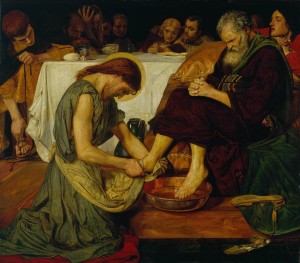We can learn a great deal from farmers as we read the Bible.
Each year, the non-profit organization MOSES (Midwest Organic & Special Education Service) holds an organic farming conference in La Crosse, Wisconsin in late February. It has become the largest gathering of organic and sustainable farmers in the country and features a wide array of workshops, roundtables, exhibits, and social events.
I just attended it for the first time and came away more aware than ever of the complexity and challenges of farming, especially if you are trying to do so in a way that sustains the life of the land and water.
What especially struck me was how thoughtful, observant, patient, open-minded, and nuanced many of the farmers revealed themselves to be, whether they were plaid-wearing young millennials or middle-aged men who looked, well, farmers or the reserved Amish men I talked to at breakfast one morning. From patterns of weed growth to the body language of a cow, the farmer must observe and interpret carefully what is in front of him while prudently considering the context. Fundamentally, I sensed deep humility.
We all could benefit from engaging the Bible and God that same way. But too often we don’t.
A good example is the nature of human exceptionalism.
This comes to mind because of something I heard recently on Janet Parshall’s program, “In the Marketplace,” on WMBI, the flagship station of the Moody Bible Institute. On this particular day, Parshall was interviewing Wesley Smith, the author of The War on Humans and a blogger about human exceptionalism on the National Review’s website. The way Parshall and Smith spoke of human exceptionalism in relationship to the natural world exemplified how easy it is for all of us to read the Bible in simplistic, self-centered ways.
In the program, Parshall played a portion of a Conservation International video in which Julie Roberts speaks as Mother Earth, and addressing humanity, she solemnly states, “I have fed species greater than you, and I have starved species greater than you.”
Parshall and Smith used this as the stepping off point for several broad assertions. First, environmentalists are anti-human. Second, extreme environmentalists exhibit a common mindset that humans are worth less than other species, that we are a destructive cancer upon the face of the earth. Above all, Parshall and Smith shared the conviction that the concern people have for earth is one more symptom of a distressing falling away from the Christian truth of human exceptionalism.
It is true. Humans are exceptional.
We do understand that people are made in the image of God, unlike any other creature. Clearly, a great deal of the Bible is about the interaction between God and people. From the beginning, God has a special relationship with humanity.
Jesus also clearly states that humans are of more value than sparrows and sheep (although there is no suggestion that sparrows and sheep have no value).
And the testimony of history reveals humanity to be endlessly inventive and creative. One advance builds on the foundation of the previous. We work technological wonders that would astound people of centuries and millennia past. We delve into the mysteries of the universe, of the workings of atomic particles, of the microbiotic worlds in our guts and in the soil.

Napoleon on his Imperial Throne (Jean Auguste Dominique Ingres); Is this the kind of human exceptionalism God wants us to exercise in the world?
But Parshall and Smith fail to provide a complete understanding of human exceptionalism in two ways.
First, they ignore sin. This should temper any discussion we have about our elite status. In fact, in the story of Noah we experience God’s utter revulsion at the violence and sin of humanity, which doesn’t sound that much different from the reaction of environmentalists to the violence we are inflicting on the life of the earth today.
Second, if you read the Bible like a good farmer, you will find a whole view of exceptionalism that is very different in nature.
When Abraham is called to be the founder of the nation Israel, one might expect Abraham to be told that the nation of which he will be the father will enjoy extreme prosperity and even build its own empire. But read Genesis 22:18 – “And through your descendants all the nations of the earth will be blessed—all because you have obeyed me.”
In fact, if you read the Bible, it’s clear that the standards and expectations for Israel are higher than for other nations. Israel’s exceptional status comes from God’s grace and from God’s choice and it brings greater responsibility and greater expectations. They are called to be holy, to bear witness to God in how they live as a light to other nations and peoples. The people of Israel, to say the least, do not always welcome this kind of exceptionalism.
When Moses is called by God and has direct interactions with God, you would be hard pressed to say that Moses’ exceptional status was intended for Moses’ glory and for Moses to exploit for his own gain. He is called for God’s purposes and Moses actually finds that role challenging, fear-inducing, and extremely frustrating. Again, the expectations for those who are given exceptional roles are high.
The point of the God-given exceptional role is serving God’s purposes.
Prophets are similar in this way. Their unique role as bearers of God’s words and messages does not make for easy lives. They speak the truth. Their earthly lives are challenging and dangerous. They are tormented by the wrongs they see and the tragedies that will unfold.
The disciples are chosen by Jesus and have the exceptional blessing of daily interaction with Jesus and the opportunity to learn about God and the kingdom of God. There are times where it’s clear they hope their selection is for their glory, even arguing about who will sit at Jesus’ right hand in heaven. In fact, their selection is for a much more serious and humble mission. They are charged with serving God by spreading the gospel and making disciples after Jesus’ death and resurrection. All of them, according to Christian tradition, with the exception of John, died as martyrs in this service.
The Apostle Paul, whose life Jesus redirected in dramatic fashion, calls himself a servant of God.
The incarnation itself speaks volumes about God and the nature of how God exercises dominion over us.
We see in Jesus a God who cares about us, creatures who in comparison to God are limited and weak. We see in Jesus a God who cares about the poor and alienated and powerless. We see a God who reminds us of our common sinfulness, who calls us to repentance.
He is a shepherd willing to give his life for his sheep, a friend willing to lay down his life for his friends. He spoke of the first being last and the last being first. He washed the feet of his disciples. There was nothing in his life that communicated that life was about power, glory, and mammon.
I am struck, too, by the parable Jesus told of the ruler and the servant, which is recounted in Matthew 18: 21-35. In it, a ruler forgives the large debt a servant owes him but the servant puts in prison a fellow servant who owed him much, much less. This angers the ruler, and he punishes the servant. There is a strong sense that the ruler desires his servants to live out the same values that he, the ruler, demonstrates.
Ultimately, Jesus demonstrates love and mercy to humanity because God so loves the world. He restrains the power he has at his disposal for what is needed for the world and humanity.

Jesus Washing Peter’s Feet (by Ford Madox Brown): The exceptionalism of Jesus.
Do we deserve this? Do we deserve a God who would become human because of his love for us and for the whole world? Is exercising our unique power in the world for power and mammon and at the expense of the life of God’s earth in tune with the exceptionalism we see in Jesus and in the Bible in general?
The first line of Rick Warren’s best-selling book, The Purpose Driven Life, captures the point of our exceptionalism perfectly: “It’s not about you.”
To be fair, Wesley Smith, who is highly articulate and compelling, does acknowledge in the interview that environmental efforts to protect clean water and clean air are important. He says we have a duty to leave a “clean environment” to “our progeny and our posterity.”
But there is something off in that eloquent phrasing. The word “clean” is a word of neatness, a self-directed and sanitized contentment with the order and comfort of things.
Our real duty is far larger than that and far less human-centered. Our duty as it relates to God’s world is to keep the world in a condition that honors God, provides a beautiful and sustaining environment for our children, and provides a beautiful and sustaining environment for all of the rest of life. Our duty as carriers of God’s image is to protect creation’s integrity and wholeness even as we must use it.
The ultimate measure of our success at carrying out that duty is whether all of creation is thriving. A shepherd who has lost many sheep but still has enough of them to eat in order to survive is not a good shepherd.
What Parshall and Smith failed to acknowledge, too, is that Christians have largely failed to be leaders in the effort to care for Creation and, in fact, too often have been leaders and apologists for the diminishment of Creation.
The fruit of this is an unraveling planet and a conviction by many that to be Christian is to support violence against God’s world and to be self-focused and self-centered. Why would that faith and value system be of any appeal to people, like Julie Roberts, who sense the mystery and beauty of this world?
Janet Parshall has it exactly right when she says, “Ideas have consequences, and bad ideas have deadly consequences.”
I encourage you to make up your own mind about what it means to be made in the image of God, what it means to have been shaped from the soil, what it means to be a disciple of Jesus, and what that all means for how we should treat the world.
And I encourage you to do that the way a good farmer would – with nuance, patience, humility, an open mind, and an open heart.







